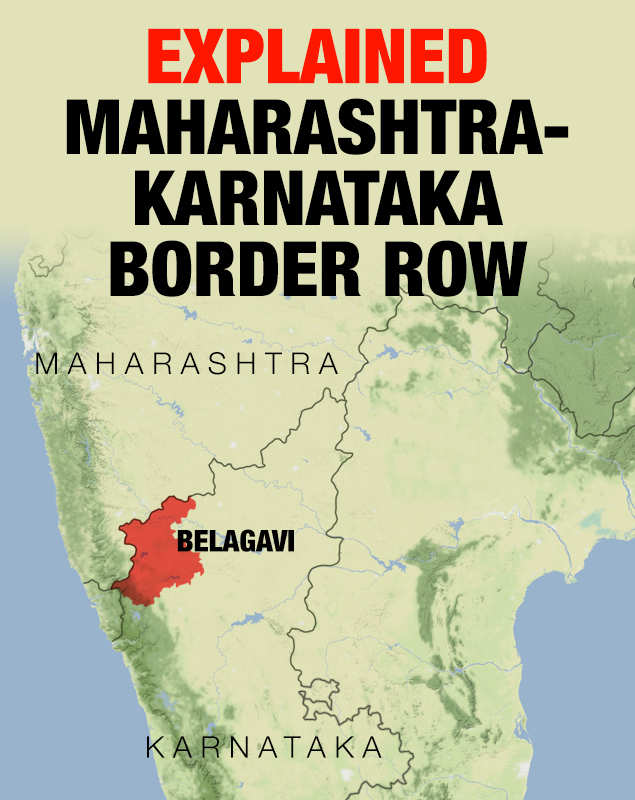Context
-
The Maharashtra and Karnataka border dispute is intensifying, with both states hardening their stance.
-
Both Houses of the Maharashtra Assembly passed a unanimous resolution to support a legal battle to resolve the dispute. This came just days after the Karnataka Assembly passed a resolution reiterating Karnataka’s position on the issue.
-
What is the Maharashtra-Karnataka border dispute?
- The border dispute over Belagavi, Karwar and Nipani in North Karnataka is long-standing. When state boundaries were redrawn on linguistic lines as per the States Reorganisation Act of 1956, Belagavi became part of the erstwhile Mysore state.
- Maharashtra claims that parts of Belagavi, where Marathi is the dominant language, should remain in Maharashtra.
- In October 1966, the Centre set up the Mahajan Commission, led by former Chief Justice of India Mehr Chand Mahajan, to resolve the border dispute in Maharashtra, Karnataka and Kerala.
- The Commission recommended that Belgaum and 247 villages remain with Karnataka. Maharashtra rejected the report, and in 2004, moved the Supreme Court.
How is the issue being resolved?
- Attempts are often made to resolve inter-state disputes with the cooperation of both sides, with the Centre working as a facilitator or a neutral mediator. If issues are resolved amicably, Parliament can bring a law to alter state boundaries, such as the Bihar-Uttar Pradesh (Alteration of Boundaries) Act of 1968 and the Haryana-Uttar Pradesh (Alteration of Boundaries) Act of 1979.
- In the Belagavi issue, Union Home Minister Amit Shah met Chief Ministers and asked them to form a six-member team, comprising three ministers from each side, to address all boundary issues.
What are the other methods available?
There are other formal methods in the Constitution to resolve inter-state disputes.
Judicial redressal
- The Supreme Court in its original jurisdiction decides imputes between states.
- Article 131 of the Constitution reads: “Subject to the provisions of this Constitution, the Supreme Court shall, to the exclusion of any other court, have original jurisdiction in any dispute
- (a)between the Government of India and one or more States; or
- (b)between the Government of India and any State or States on one side and one or more other States on the other; or
- (c) between two or more States, if and in so far as the dispute involves any question (whether of law or fact) on which the existence or extent of a legal right depends: Provided that the said jurisdiction shall not extend to a dispute arising out of any treaty, agreement, covenant, engagements, and or other similar instrument which, having been entered into or executed before the commencement of this Constitution, continues in operation after such commencement, or which provides that the said jurisdiction shall not extend to such a dispute.
Inter-state Council:
- Article 263 of the Constitution gives powers to the President to set up an Inter-state Council for resolution of disputes between states.
- The Council is envisaged as a forum for discussion between the states and the Centre.
- In 1988, the Sarkaria Commission suggested that the Council should exist as a permanent body, and in 1990 it came into existence through a Presidential Order.
- The provision reads: “provisions with respect to an inter State Council If any time it appears to the President that the public interests would be served by the establishment of a Council charged with the duty of
- (a) inquiring into and advising upon disputes which may have arisen between States;
- (b) investigating and discussing subjects in which some or all of the States, or the Union and one or more of the States, have a common interest; or
- (c) making recommendations upon any such subject and, in particular, recommendations for the better co ordination of policy and action with respect to that subject, it shall be lawful for the President by order to establish such a Council, and to define the nature of the duties to be performed by it and its organisation and procedure.
- In 2021, the Centre reconstituted the Inter-state Council and the body now has 10 Union Ministers as permanent invitees.
- The standing committee of the Council has been reconstituted with Home Minister Amit Shah as Chairman.
- Union Finance Minister and the Chief Ministers of Maharashtra, UP, and Gujarat are some of the other standing committee members.
What are some other inter-state disputes in India?
- In a reply to Parliament, in 2015, the Centre said that there are border disputes mostly arising out of claims and counter-claims over territories between Assam-Meghalaya; Assam-Nagaland; Assam-Mizoram; Assam-Arunachal Pradesh and Maharashtra- Karnataka.


Source: IE
Visit Abhiyan PEDIA (One of the Most Followed / Recommended) for UPSC Revisions: Click Here
IAS Abhiyan is now on Telegram: Click on the Below link to Join our Channels to stay Updated
IAS Abhiyan Official: Click Here to Join
For UPSC Mains Value Edition (Facts, Quotes, Best Practices, Case Studies): Click Here to Join
